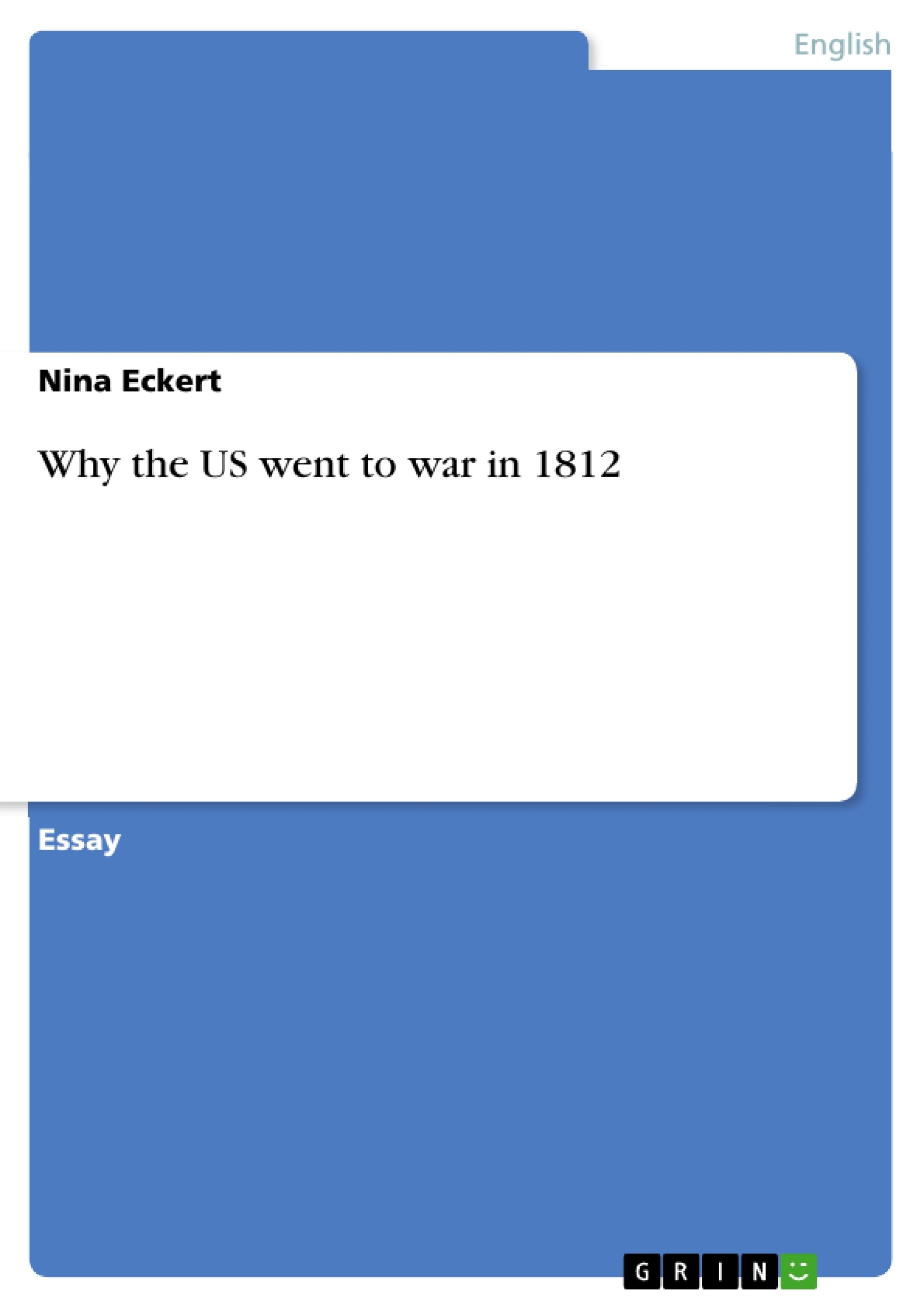When Europe exploded in war in 1803, the United States became involved in
European affairs once more. In 1806, France, and one year later Britain trampled on
neutral rights by forcing other nations to cease trading with their enemy. On top of it,
the British boarded American ships to seize sailors who had allegedly deserted from the
Royal Navy. There-upon President Thomas Jefferson and from 1809 onwards James
Madison initiated restrictive measures themselves, but the rivalries were only to become
stronger. “In the end, unable to sustain peace, the United States chose war – a war, some
have suggested, that ranks as the second war for independence.“ (128)
[...]
Inhaltsverzeichnis (Table of Contents)
- „Commerce, character, a nation`s best treasure, honor!\"1 - why the United States went to war in 1812
- The War and Its Underlying Ideological Crisis
- The “Chesapeake Affair”
- The “War Hawks” and their Political Power
- Commercial Restrictions and the Embargo Act
- America’s Desire for Expansion
Zielsetzung und Themenschwerpunkte (Objectives and Key Themes)
This text examines the reasons behind the United States' decision to declare war on Great Britain in 1812. The author aims to demonstrate that the war was not solely driven by domestic, political, or economic factors, but rather by a deeper ideological crisis that challenged the nation's identity and sense of self. The text explores various motivations, including a desire to maintain national honor and independence, to revitalize a challenged national character, and to expand the nation's territory.
- The significance of national identity and honor in the context of foreign relations
- The impact of domestic and foreign conflicts on the development of American national character
- The role of political and economic factors in shaping foreign policy decisions
- The influence of territorial expansionism on American political thought and action
- The relationship between war and national unity
Zusammenfassung der Kapitel (Chapter Summaries)
The first chapter examines the historical context of the War of 1812, highlighting the tensions between the United States and Great Britain. It explores the events leading up to the war, including the British practice of impressing American sailors and the disruption of neutral trade. This chapter emphasizes the underlying ideological crisis that fueled the war, highlighting the desire for national independence and the yearning for solidarity.
The second chapter focuses on the “Chesapeake Affair,” a pivotal event that escalated tensions between the two countries. The author analyzes the diplomatic fallout of the incident, including the American public’s outrage and the political maneuvering that contributed to the war declaration.
The third chapter discusses the role of the “War Hawks,” a faction within the American political scene who advocated for war with Great Britain. The author explores their motivations, emphasizing their desire to revitalize the strength and power of the young republic.
The fourth chapter delves into the economic dimension of the war, examining the impact of commercial restrictions and the Embargo Act on American trade. It analyzes the failed attempts to coerce Britain and France to respect neutral rights, ultimately concluding that these measures were ineffective and contributed to the declaration of war.
The final chapter briefly explores the American desire for territorial expansion, particularly the focus on Canada. The author discusses the debate surrounding the potential benefits and challenges of conquest, providing an early glimpse into American expansionist ambitions.
Schlüsselwörter (Keywords)
Key themes and concepts explored in the text include: American national identity, foreign policy, international relations, maritime conflict, neutral rights, territorial expansion, political ideology, national character, domestic transformation, the Chesapeake Affair, the War Hawks, the Embargo Act, and the War of 1812.
Frequently Asked Questions
What were the main reasons for the US declaring war in 1812?
The war was driven by maritime conflicts, the violation of neutral rights, the impressment of American sailors by Britain, and a deeper ideological crisis regarding national honor.
What was the significance of the "Chesapeake Affair"?
The 1807 incident, where a British ship attacked the USS Chesapeake, caused massive public outrage in America and served as a major catalyst for the eventual declaration of war.
Who were the "War Hawks"?
The War Hawks were a group of pro-war politicians who advocated for military action to defend national independence and potentially expand US territory into Canada.
How did the Embargo Act influence the conflict?
The Embargo Act was an attempt at economic coercion that failed to stop British and French interference with US trade, eventually leading the US to see war as the only remaining option.
Was territorial expansion a goal of the War of 1812?
Yes, a desire to expand into Canada and remove British influence from North America was a significant motivating factor for many American leaders at the time.
- Quote paper
- Nina Eckert (Author), 2002, Why the US went to war in 1812, Munich, GRIN Verlag, https://www.grin.com/document/115470



